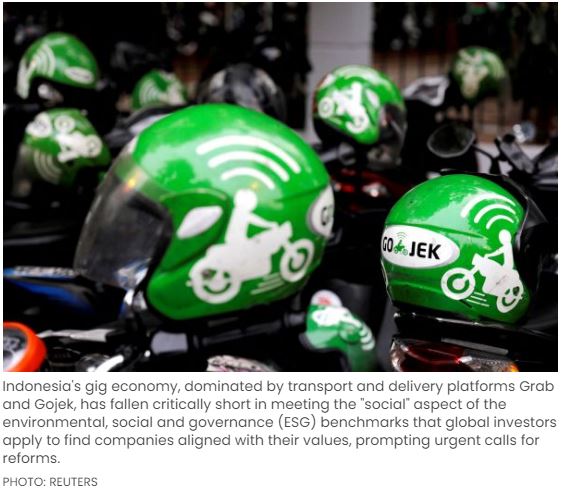Indonesia’s gig economy fails to deliver on the social aspect of ESG
INDONESIA’S gig economy, dominated by transport and delivery platforms Grab and Gojek, has fallen critically short in meeting the “social” aspect of the environmental, social and governance (ESG) benchmarks that global investors apply to find companies aligned with their values, prompting urgent calls for reforms.
In the first fair work ratings study in Indonesia, the nine most visible services from six different platforms were evaluated. Scores fell below the halfway mark of possible scores, leaving plenty of room for improvement in the country’s gig economy, which hires at least 4 million people and contributes no less than US$7 billion to the overall economy.
The study evaluated Gojek, Grab, Maxim, Anteraja, Ninja Xpress and Paxel against the five global principles of fair work – pay, conditions, contracts, management and representation.
The authors of “Fairwork Indonesia Ratings 2021” wrote: “Overall, the Fairwork scores in this report suggest that pay and work conditions in Indonesia’s gig economy fall well short of decent work standards, and that reforms are needed in order to develop a fairer and more equitable gig economy.”
In a score out of 10, the two services (motorcycle and car-taxi) separately assessed for each of Grab (GrabBike, GrabCar) and Gojek (GoRide, GoCar) scored five points each. Paxel scored three points, and Maxim’s two services (motorcycle service Maxim Ojek and car service Maxim Taxi) scored one point each. Both Ninja Xpress and Anteraja got zero points.
Despite the Indonesian government’s guidelines for per-kilometre fare payments to meet minimum wage standards, no platform was able to provide evidence that they paid all workers a fair wage once workers’ logged-in hours and work-related costs were taken into consideration.
Those who did earn more than the minimum wage often worked long hours. Those surveyed averaged more than 70 hours of work per week, with some working more than 100 hours. In addition, the gross figure fails to take into account work-related costs such as gasoline, vehicle rent/lease, insurance and vehicle servicing, which can eat up more than half of a worker’s gross income.
Only Grab and Gojek’s two services and Paxel’s had policies and practices to protect workers from risks arising at work, including accident insurance and emergency helplines. They also provided other forms of support, such as access to health insurance, sick pay compensation for those infected with Covid-19, access to food and services discounts, training and other wellbeing initiatives. These initiatives were not evident on other platforms.
Most of the platforms had clear, accessible terms and conditions for workers that were subject to Indonesian law. However, none of the platforms was able to show evidence that these terms and conditions fairly shared risks and liabilities between workers and platforms.
In terms of fair management, only Grab and Gojek have developed policies and initiatives that seek to address key local discriminations and inequities. No platform was able to show evidence of fair representation of gig workers. While worker associations exist, they are not formally recognised either in law or by platforms. Some workers are also wary of joining collective protests or strikes due to fear of penalties such as deactivation by platforms.
While the gig economy provides equal opportunity and flexibility for female workers, sexual harassment and discrimination are fairly widespread. On average, female workers earn less than their male counterparts, in part due to their shorter working hours, because they feel unsafe to work late into the night, and have greater household responsibilities than men.
To improve the working conditions of Indonesian gig workers, Fairwork said gig workers should receive the minimum wage after costs. The Indonesian government should change the labour law and recognise gig workers as employees with their rights and entitlements. Indonesian consumers can also use their power to put pressure on platforms, particularly by choosing higher scoring platforms which provide better conditions for workers.
Source: https://www.businesstimes.com.sg/asean-business/indonesias-gig-economy-fails-to-deliver-on-the-social-aspect-of-esg


 English
English




